
Antibiotics are easy to remain in animals and produce bacterial resistance, seriously affecting the safety of livestock and poultry products and human health. If antibiotics are used for a long time in the process of livestock and poultry breeding, the disease resistance of livestock and poultry will be greatly reduced, and the drug resistance of bacteria will continue to increase, which will inhibit the growth of respiratory and intestinal microorganisms, resulting in antibiotics remaining in animals.
Once antibiotics enter the human body with animal-derived food, it is easy to develop drug resistance. When people are infected with similar drug-resistant strains, it will increase the difficulty of treatment. Frequent consumption of animal-derived food containing antibiotic residues will destroy the intestinal microecological balance in the body. Inhibition of sensitive bacteria, resulting in a large number of resistant bacteria and conditional pathogenic bacteria. Long-term accumulation in the human body reaches a certain concentration, which will cause drug accumulation, cause damage to the kidneys, urinary system, and audiovisual nerves, and inhibit bone growth and tooth development in children.
Advantages of adding plant extract feed additives to feed
1. Guarantee the growth of animals
Plants are rich in saponins and flavonoids, which can enhance the immune function of the body and promote the growth and development of animal immune organs. research found that adding the extract of Scutellaria baicalensis to the diet can promote the growth of broiler chickens, improve feed utilization, reduce the ratio of feed to weight, enhance immunity and improve the function of chicken intestinal mucosal barrier. Wang Changwen et al found that adding Acanthopanax acanthopanax extract to the diet can improve the total antioxidant capacity of the serum, improve the anti-stress ability of weaned and lactating calves, enhance immunity, reduce the rate of diarrhea and inhibit the reproduction of harmful bacteria in the intestinal tract, and can Act as an alternative to antibiotics.
2. Improve the quality of livestock products
Some active ingredients in natural plants can be deposited into animal products, thereby improving the quality of animal products. Adding pine needle powder and garlic to pig rations can make pork meat more tender and delicious; adding garlic and pepper to broiler rations can promote chicken appetite, enhance disease resistance, and improve meat quality; in laying hens rations Adding seaweed powder can increase the iodine content in eggs and deepen the color of egg yolk. Research by Yao Meilan and others found that adding seabuckthorn pomace to feed can significantly improve the nutrition and color of egg yolk. Adding Qicao extract to the diet of laying hens can improve egg production performance and egg quality.
3. Improve feed quality
Natural plants are rich in a variety of nutrients, which can be added to the feed to balance the nutritional content and proportion of the feed, such as protein, amino acid, sugar, starch, fat, minerals, vitamins, macro elements and trace elements wait. Some natural plants can also correct the taste of feed, increase fragrance and deodorize, prevent feed corruption, and prolong the shelf life of feed, such as catechu, hibiscus bark, pepper, white fresh bark, red pepper, etc. There are also some natural plants with antibacterial functions, such as honeysuckle, forsythia, Folium Isatidis, Radix Isatidis, Houttuynia cordata, and dandelion.
https://www.arshinefeed.com/Knowledge/the-advantages-of-plant-extract-feed-additives-in-antibiotic-free-farming887




